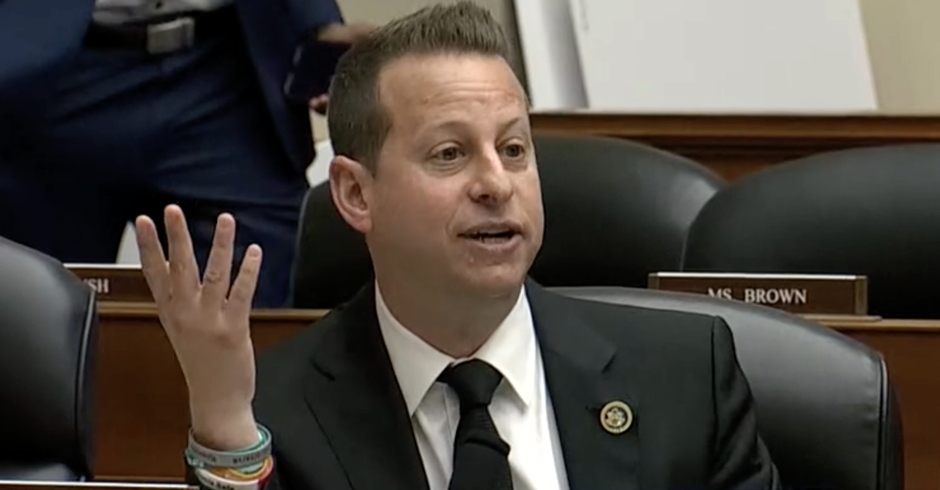A ‘Dreamer’ Walking on the Edge of Darkness and Fear in Trump’s America
“I’d Die in Guatemala – See, I’m Gay.â€
As the marked police cruiser slows and then passes, the young man glances up nervously from his coffee, his body tensing in a reflexive way, as if getting ready to bolt if necessary. His concern? Not that he has any warrants or charges pending, in fact, that is actually far from being the case. No, his greatest fear these days is being asked to provide identification. A government issued I.D. is something he simply cannot obtain as he was brought to the U.S. as a child from Guatemala and his family crossed the Mexican-U.S. border undocumented.
The slightly built 18 year-old has an easy smile, speaks perfect English with just a trace of an accent and a tiny bit of adolescent slang. But because he is obviously Latino he knows from bitter personal experience that here in these suburban outskirts of the Georgia capital city’s metropolitan area, he has an increased risk of being racially profiled by law enforcement since the Trump administration took office last January.Â
Accompanying him and sitting protectively on either side of him are his nervous, shy, and obviously proud parents who speak little to no English at all. In fact, he answers for them after quick consultations as the interview progresses. ‘Alejandro,’ a pseudonym mutually agreed upon to protect him and his parents and siblings for the purposes of this interview, says that he is scared for his future and for his family.Â
_a.jpg)
Like most ‘Dreamers,’ he came to the United States at a very young age, in his case he was only nine years old.
The DREAM Act (Development, Relief, and Education for Alien Minors), first introduced into Congress in 2001, was designed to be a pathway to citizenship to young people who were brought to the United States as children like Alejandro without proper documentation.
Alejandro’s parents had fled their village home along the Guatemalan border with Mexico as the narco-drug cartels and their accompanying violence escalated in 2009. This coming on the heels of an uneasy transition to peace after the end of a bloody civil war thirteen years before in 1996.
Guatemala has one of the highest murder rates in the world.
A report issued by Human Rights Watch in 2010 documented the Guatemalan violence that Alejandro’s parents were fleeing from:Â
Guatemala has one of the highest homicide rates in the hemisphere, reaching 48 per 100,000 inhabitants in 2008. Numbers for the start of 2009 indicate that the rate may grow even higher.Â
The existence of clandestine security structures and illegal armed groups or organizations is an important factor contributing to this violence. These groups employ violence and intimidation in pursuing both political objectives and illicit economic interests, including drug trafficking. Maintaining links with state officials, they consistently obstruct anti-impunity initiatives.Â
Powerful and well-organized youth gangs, including the “Mara Salvatrucha” and “Barrio 18,” have also contributed to escalating violence in Guatemala. The gangs use lethal violence against those who defy their control, including gang rivals and former members, individuals who collaborate with police, and those who refuse to pay extortion money.Â
The gangs are believed to be responsible for the widespread killings of public transit operators targeted for extortion: in 2008, 165 drivers were murdered, and the killings have continued throughout 2009.
Police have used repressive measures in attempting to curb gang activity, including arbitrary detentions and extrajudicial killings. Investigations by the Human Rights Ombudsman’s Office and NGOs have found police involvement in “social cleansing”-killings intended to eliminate alleged gang members and criminals.
Alejandro and his fellow ‘Dreamers’ have grown up in this country and consider themselves to be American, but lack the documents to fully participate in society, which – in some cases – means that they are unable to pursue college or university or enlist into the U.S. Armed Services. In many other cases it means they labor at jobs under the table or on a daily cash basis. After numerous attempts to pass the legislation even with nearly 70% of Americans in support, in 2012 then U.S. President Barack Obama announced a temporary program that allowed Dreamers to come forward, pass a criminal background check, pay hundreds of dollars, and apply for work permits. The program is called Deferred Action for Childhood Arrivals, or DACA for short.Â
Alejandro had applied for the program last year not long after his 17th birthday in the hopes of possibly attending university, but in September of this year, an Executive Action by President Donald Trump effectually squashed those hopes. Now, nearly two months after Trump officially rescinded the program and essentially dumped the burden of passing the DACA legislation in the laps of the Republican majority-led Congress, there appears to be little in the way of substantive action regarding the decidedly needed legislation.Â
Proponents of the legislation and advocacy groups warn that for the Dreamers, Congressional failure to pass alternative legislation, since the current policy is due to expire March 5, 2018, upwards of around 800,000 young people across the United States could possibly be deported to countries they don’t remember and like Alejandro, do not consider their homeland.
Frustrating many has been the stepped up detention and deportation of undocumented immigrants by the current administration, led by a president that on the campaign trail labeled the legislation “illegal executive amnesties” that “defied federal law and the Constitution.”

“We call each other before we knock on our friend’s doors- ‘La Migra’ yeah ICE [U.S. Department of Homeland Security- Immigration and Customs Enforcement] they come all the time now, they knock loud or sometimes they don’t they just break doors down.†Alejandro looks down at the table for a moment. “Mi Papi, Mama, yeah so they both go to work but I worry that I’ll come home from school and they’ll be arrested. I’ll have to take care of my little brother and sister but if they take me- if I have to be deported?†Â
 He looks at his parents, his mother sensing his distress gently reaches over and takes his hand, telling him softly in Spanish, “Está bien mi hijo†[It’s ok my son.] “See – I did the right thing, I registered – why do they hate us?â€Â
He looks at his parents, his mother sensing his distress gently reaches over and takes his hand, telling him softly in Spanish, “Está bien mi hijo†[It’s ok my son.] “See – I did the right thing, I registered – why do they hate us?â€Â
The question lingers for a moment, then he details filling out the forms executing the criminal background paperwork, submitting his fingerprints, his putting down his home address which exposes not only himself should DACA end but also placing his parents at risk. His youngest sibling was born in the United States, but like him, his younger brother was born in Guatemala. He also applied and received a work authorization which allowed him to get a job at a local mall, unlike his parents who work as a day laborer and a housekeeper respectively, and very much “off the books.â€Â
Recent press coverage of numerous stories have borne this out. “The Trump administration has left their dogs off the leash,†immigrant rights advocate Julieta Garibay, co-founder and Texas Director of United We Dream said. In one highly publicized incident which occurred recently in San Marcos, Texas, Felipe Abonza-Lopez, a 20-year-old Dreamer, was detained without cause for over a month. Making circumstances worse was the fact that Felipe is disabled and uses a prosthetic leg, which in a written letter to his parents and attorney, he relayed that he was afraid to remove because another inmate of the detention facility in Pearsall Texas possibly would have stolen or severely damaged it. This led to physical pain which he wrote that the guards would mock. He was finally released after more than one month in detention. Garibay credits national publicity and the ensuing outrage as the factors which forced immigration officials to let him out of jail.
“We celebrate the people’s power to ensure Felipe was released. We are not forgetting that the Sheriff and Border Patrol dehumanized, criminalized, detained, and terrorized Felipe and his family. This is a clear example of emboldened racism in an era of Trump in a state where Abbott and Patrick pull the strings,†Garibay said in an emailed statement, adding: “We will continue to take the streets and fight against SB4 and demand that a clean Dream Act is passed immediately. Our community cannot and will not wait. Immigrant youth across our beautiful state will not back down. We are here to stay, and we are here to fight for justice!â€
For Alejandro, his adopted state of Georgia has now become a place he deems much less “safe.” A spokesperson for Republican Georgia Governor Nathan Deal says that there have been no real changes in the attitudes overall by Georgia law enforcement agencies regarding the Latino communities in the state, but then again Deal himself has made public statements which reflect his opposition to DACA and Dreamers.  Â
During an appearance speaking to the University of Georgia chapter of the College Republicans in 2014, Deal racially profiled Hispanic students who questioned him after the speech. Four students from the Undocumented Student Alliance stood up to question Deal about a Board of Regents policy that bans undocumented immigrants from attending the university.
“Gov. Deal, you spoke about protecting the HOPE Scholarship and you’re a supporter of education, but why do you deprive undocumented immigrants who’ve lived here their entire lives from the right to come here and attend school with all of us?†asked student Carver Goodhue.
In response Deal argued there was not an effective way, at least not at the state level, to help the would-be students who want to attend classes at UGA and other state universities but are barred from doing so by a four-year-old Board of Regents policy. Then he noted that a majority of the state’s residents wouldn’t support revoking the measure. But, as he responded he stated, “I presume that you are†undocumented.
https://www.youtube.com/watch?v=pPFeo-PnNpAÂ
Retorting sharply, another of the students, Lizbeth Miranda asked, “I don’t know why you thought I was undocumented. Is it because I look Hispanic?†Her response prompting boos from the audience. “I apologize if I offended you,†Deal quickly replied.
But the real problem, Alejandro says, is that every encounter with any member of a law enforcement agency now is fraught with the danger of being arrested simply because he or his peers don’t have proper ID’s. Then too he doesn’t hold out much hope as it seems that Congress doesn’t really want to help him or the other Dreamers. Another fact is that, since Trump’s action, over one hundred undocumented immigrants every day are losing their DACA status.
In an email, Nicole Prchal Svajlenka, Senior Policy Analyst of Immigration Policy for the Washington, D.C. based Center for American Progress, said:
“Often times when the press reports on this story they repeat the administration’s line that President Trump gave Congress six months to act before DACA recipients begin losing protection in March. Although the numbers will, in fact, skyrocket beginning on March 6, that description loses sight of the 22,000 people who will already have lost protection by that point.Â
At this point nearly 8,900 DACA recipients may have lost their protection from detention and deportation. By Thanksgiving, that number will be 9,600. And when Congress heads home to celebrate the holidays with their families next month, nearly 13,000 individuals already will have seen their DACA expire.
The futures of hundreds of thousands of young people hang in the balance, and it is absolutely urgent that Congress provide them relief by passing the Dream Act. But we can’t wait until February or March – we need it now to prevent any more DACA recipients from losing their protections. The crisis has already begun, and will only get worse each day come March 6th.â€
The Center for American Progress reported that 122 Dreamers are losing DACA protection each day between October 5, 2017 and March 5, 2018. “The reality is that with every passing day, DACA recipients lose their protections and become vulnerable to a regime of enforcement overdrive.â€
“Mi familia, we’re good people, we’re hard workers, we contribute we don’t take – but they don’t care.†He looks defeated. “I want to be an engineer – you know, build things that help people, I want to be a part of this country and yeah, be a citizen help out,†Alejandro says.Â
He then related that he determined what path he wanted his education and professional career to go after watching the 2015 George Lopez film, “Spare Parts,” with his family. “Those guys were like me, no papers but they won the whole USA contest in Underwater Robotics engineering and then they became regular Americans too.†He says he always loved designing and building things and working on fixing things with his father. For him this is his dream, which he says just simply would be impossible if he is deported back to Guatemala. Â
As the debate rages on in Washington and across the nation, proponents point out that the sudden turn in policy, especially in enforcement has created fear and uncertainty. Daily Kos writer Gabe Ortiz reported that Houston Police Chief Art Acevedo writes that passing legislation to protect undocumented immigrant youth—for example, the bipartisan DREAM Act—is essential to rebuilding both trust and neighborhoods around Texas.
Ortiz writes that the chief revealed that due to deportation fears, the number of Latinos reporting when they’ve been victims of sexual assault is down nearly 43 percent from last year, and it’s a disturbing trend seen nationwide. “Immigrants are also essential for keeping Houston safe,†Chief Acevedo continues.Â
“Having served in law enforcement for more than 30 years, I believe trust between police and residents is key to everyone’s safetyâ€
When immigrants hear of a U.S.-Mexico wall or a nationwide deportation “crackdown,” they fear going to police to report criminal activity. I currently lead a department of 5,200 law enforcements officers and 1,200 support personnel. They will tell you that the ugly national anti-immigrant rhetoric has had a chilling effect on their work with residents. They are now less willing to work with our police to report suspicious activity.
[…] We are concerned that, absent any action by Congress, Dreamers will be driven into the shadows and will not report crimes or cooperate with investigations. When Dreamers and other immigrants feel safe working with local police, all communities are safer.
[…]
“With DACA ending,†he writes, “the absence of a legislative solution would be short-sighted and counterproductive. It would hurt our city in one of its most vulnerable moments. I have seen how strong Houston can be in the midst of devastation. Dreamers and other immigrants living in Houston only make us stronger. For the sake of the city, let’s welcome them so that their, and our, future is brighter.â€
Alejandro’s parents say that all they really want is a secure future for their children and a place of safety away from the bloodshed and violence in Guatemala that they fear may never end. He says that all he wants is a chance to make a difference, he is more than willing to serve in the U.S. military to honor his adopted home and as a thank you. But there’s a larger reason, too, he says, looking over at his parents as he asks me to not react since they don’t know what he’s about to tell me: “I’d die in Guatemala – see, I’m gay.â€
Brody Levesque is the Chief Political Correspondent for The New Civil Rights Movement.
You may contact Brody at Brody.Levesque@thenewcivilrightsmovement.com
To comment on this article and other NCRM content, visit our Facebook page.
Images:Â Charles Reed / U.S. Immigration and Customs Enforcement
If you find NCRM valuable, would you please consider making a donation to support our independent journalism?

Enjoy this piece?
… then let us make a small request. The New Civil Rights Movement depends on readers like you to meet our ongoing expenses and continue producing quality progressive journalism. Three Silicon Valley giants consume 70 percent of all online advertising dollars, so we need your help to continue doing what we do.
NCRM is independent. You won’t find mainstream media bias here. From unflinching coverage of religious extremism, to spotlighting efforts to roll back our rights, NCRM continues to speak truth to power. America needs independent voices like NCRM to be sure no one is forgotten.
Every reader contribution, whatever the amount, makes a tremendous difference. Help ensure NCRM remains independent long into the future. Support progressive journalism with a one-time contribution to NCRM, or click here to become a subscriber. Thank you. Click here to donate by check.
 |






















